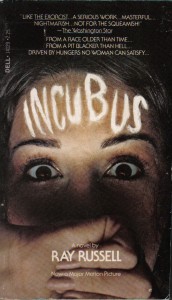 Fans of the movie The Incubus, a demon flick filmed like a slasher movie, will be surprised if they read Ray Russell’s original novel. The book is obviously influenced by H.P. Lovecraft’s Cthulhu mythos with a bit of Blatty’s The Exorcist and a dash of Penthouse Letters thrown in to spice things up. My love for the 1982 film version (which you can read my review for right . . . wait a minute. What the hell happened to all of the reviews?) drove me to seek out Russell’s novel. I wanted to know what happened to John Cassavetes’ character after the stunning ending and a little more explanation as to the Incubus’ origin. What I discovered is the novel is a completely different creature when compared to the film.
Fans of the movie The Incubus, a demon flick filmed like a slasher movie, will be surprised if they read Ray Russell’s original novel. The book is obviously influenced by H.P. Lovecraft’s Cthulhu mythos with a bit of Blatty’s The Exorcist and a dash of Penthouse Letters thrown in to spice things up. My love for the 1982 film version (which you can read my review for right . . . wait a minute. What the hell happened to all of the reviews?) drove me to seek out Russell’s novel. I wanted to know what happened to John Cassavetes’ character after the stunning ending and a little more explanation as to the Incubus’ origin. What I discovered is the novel is a completely different creature when compared to the film.
The major plot is the same. Women in the sleepy little town of Galen are being attacked and raped by an Incubus trying to extend the bloodline a few more generations. Julian Trask, a character never mentioned in the film, comes to town armed with Artes Perditae, an ancient book concerning the “Dawn Gods” and their unholy offspring. The book is made from the flesh skinned from witches and plays a pretty significant part in the story. Doc Jenkins, when he isn’t performing autopsies on victims, spends most of his time getting drunk with Trask and writing witty pieces for the Galen newspaper. The Incubus has superhuman strength, skin thick enough to stop bullets, and the ability to control the four major elements.
Russell’s writing is a bit disjointed. The second chapter starts off with a nameless narrator explaining life in Galen. This writing style is dropped half way through the chapter and is never used again. The attack scenes are brutal, disturbing pieces yet Russell turns them humorous during the closing chapters. The Incubus goes on a rampage but is held at bay when the entire female population is armed with guns. Those ladies blast lamps and bushes all to hell but they never quite seem to hit the monster. The action and suspense stops dead whenever Trask and the Doc start drinking or the Doc feels philosophical. The reader has to wade through page upon page of drunk logic from the Doc and psudo-science mumbo-jumbo from Trask.
There are two things in Incubus that will interest slasher fans. First, the Incubus is referred to as The Shape whenever it’s lurking in the bushes or hiding in a tree. Second, the description of the Incubus when it is finally revealed reminded me of the ending of Sleepaway Camp. Now, I’m not suggesting John Carpenter and Robert Hiltzik drew inspiration from this novel. But it’s hard not to think about Michael Myers and Angela Baker when reading these sections.
Incubus has plenty of suspense, shocks, and sleaze but the story is dragged down by two very dull main characters. The town folk of Galen are much more interesting and have more fun in their daily lives. Knowing the Incubus’ true identity does weaken the twist ending but it adds to the suspense in other areas. Trask might think placing the women of Galen in dorms for their protection is a good idea, but fans of the movie know it’s a bad idea doomed to end in misery and blood.

2 Responses to Incubus: The Novel